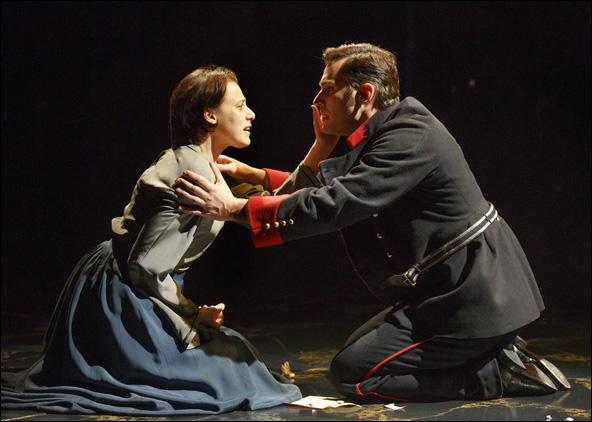“Mr. Tynan, who died in 1980, covered theater in London and New York from 1952 to 1963, and throughout that time he was known as the most spectacularly savage of critics, a stiletto-toting wit who could coin a telling phrase and make it stick. He’s been on my mind of late, for it happens that Mr. Tynan permanently retired from drama criticism exactly 50 years ago. Back then he was famous, but now he is no longer well remembered save by his surviving victims…”
Archives for March 1, 2013
TT: Smaller is bigger
In today’s Wall Street Journal drama column I review two outstanding off-Broadway shows, the Classic Stage Company revival of Passion and Liz Flahive’s new play, The Madrid. Here’s a excerpt.
* * *
Stephen Sondheim may be a Broadway baby, but most of the best revivals of his musicals have been mounted in small-to-medium-sized theaters and accompanied by chamber ensembles, not budget-busting pit orchestras. While John Doyle didn’t invent this approach, it was his 2005 Broadway revival of “Sweeney Todd” that introduced many New Yorkers to the subtle joys of small-scale Sondheim. Now Classic Stage Company has given us a Doyle-directed off-Broadway version of “Passion,” the last and best of Mr. Sondheim’s three collaborations with James Lapine. Accompanied by a nine-piece band and performed in the company’s 180-seat theater, this “Passion” is memorable in every way, starting with Judy Kuhn’s quietly fierce performance as the show’s love-besotted anti-heroine. It will be a long time before we see another staging of “Passion” that speaks so eloquently of the black mysteries of the human heart….
 Mr. Doyle, who also designed the set for this production, has approached “Passion” not as a naturalistic love story but as a piece of lyric theater, placing it in the simplest of environments, an open thrust stage, and arranging the actors in quasi-balletic stage groupings that are as poetic as the songs they sing. The theater is small enough that the performers need never raise their voices: They speak of their all-consuming passions in the softest of tones, and we are drawn into their plight like a lifeboat being pulled into a whirlpool.
Mr. Doyle, who also designed the set for this production, has approached “Passion” not as a naturalistic love story but as a piece of lyric theater, placing it in the simplest of environments, an open thrust stage, and arranging the actors in quasi-balletic stage groupings that are as poetic as the songs they sing. The theater is small enough that the performers need never raise their voices: They speak of their all-consuming passions in the softest of tones, and we are drawn into their plight like a lifeboat being pulled into a whirlpool.
Ms. Kuhn is made up to look drab but not overtly ugly, and she sings of her doomed love in so understated a way that you respond to her not as a monstre sacré of desire but as a human being, at once pitiable and–yes–beautiful….
Liz Flahive made her Off-Broadway debut in 2008 with “From Up Here,” a flawed but sharp-witted little tale of suburban life. Then she dropped off the scope and became a producer for Showtime’s “Nurse Jackie,” in which capacity she got to know Edie Falco, the show’s star. Now Ms. Falco, who likes to do plays in between shooting TV episodes, is appearing in “The Madrid,” Ms. Flahive’s second play, which is even better than “From Up Here.”
Ms. Falco plays a middle-aged kindergarten teacher who walks out on her husband (John Ellison Conlee) without warning or apparent reason, leading her 22-year-old daughter (Phoebe Strole) to move back home in order to take up the emotional slack. Ms. Flahive has realized the promise of “From Up Here” in “The Madrid,” which is the smartest new domestic drama to come along since Amy Herzog’s “4000 Miles.” Neatly structured and unassumingly well-written, it has thought-provoking things to say about the loosening of postmodern family ties…
* * *
Read the whole thing here.
Judy Kuhn talks about Passion:
TT: Too clever by half
In today’s Wall Street Journal “Sightings” column I reflect on the career of Kenneth Tynan. Here’s an excerpt.
* * *
So far as I know, Kenneth Tynan is the only real-life drama critic to have been portrayed in a stage play under his own name. Tracy Letts played him as an effete, stuttering insult-monger in the 2005 Off-Broadway production of Austin Pendleton’s “Orson’s Shadow,” and anyone who ever saw the real man on TV would have marveled at the lethal accuracy of Mr. Letts’ performance. Mr. Tynan, who died in 1980, covered theater in London and New York from 1952 to 1963, and throughout that time he was known as the most spectacularly savage of critics, a stiletto-toting wit who could coin a telling phrase and make it stick. He’s been on my mind of late, for it happens that Mr. Tynan permanently retired from drama criticism exactly 50 years ago. Back then he was famous, but now he is no longer well remembered save by his surviving victims. Indeed, I doubt that many viewers of “Orson’s Shadow” under the age of 70 realized that he was anything other than a fictional character–a fitting fate for a critic in whom talent and triviality were always at odds….
 Born in 1927, Mr. Tynan dreamed of becoming a director, but soon discovered that his real gift was as a writer. His timing was on the nose. Postwar England was gray, genteel, and ultra-careful–but not so the flamboyant Mr. Tynan, who had the indispensable critical gift of being able to communicate enthusiasm. Many critics are too cautious to hurl their hats in the air, but Mr. Tynan poured his excitement straight onto the page, and his reviews crackled with a sense of occasion….
Born in 1927, Mr. Tynan dreamed of becoming a director, but soon discovered that his real gift was as a writer. His timing was on the nose. Postwar England was gray, genteel, and ultra-careful–but not so the flamboyant Mr. Tynan, who had the indispensable critical gift of being able to communicate enthusiasm. Many critics are too cautious to hurl their hats in the air, but Mr. Tynan poured his excitement straight onto the page, and his reviews crackled with a sense of occasion….
When people talked about his reviews, though, it was usually the ones in which he pulled his knife and started slashing. In the words of John Gielgud, “They’re wonderful–when it isn’t you.” It was Mr. Tynan who described Vivien Leigh’s Lady Macbeth as “more niminy-piminy than thundery-blundery…but still quite competent in its small way” and dismissed Orson Welles’ overblown Othello as “Citizen Coon.” Even his admirers were disturbed by his ungenerous brilliance. One of them, Harold Clurman, wrote that “his cleverness at times stands out on the body of his work as a sort of decorative rash on a young man’s face.”
In addition, Mr. Tynan was a superficial thinker who donned ideas as if they were suits. Too often he “saw” the show that he expected to see instead of the one on stage….
* * *
Read the whole thing here.
TT: Almanac
“They were Germans, and their readiness to obey instructions was a measure of their civilization, and their tragedy.”
Len Deighton, Winter: A Novel of a Berlin Family
